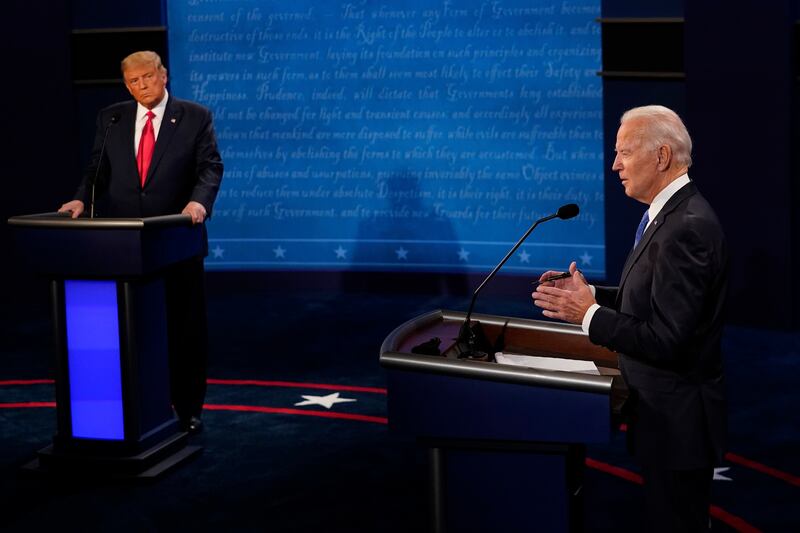The 2020 presidential debate season has mercifully come to a close. Thursday night’s debate was marked by far fewer personal insults and more opportunities to actually see the differences between the two candidates. Sadly, both men spent more of their time talking about the weaknesses and mistakes of their opponent than expounding on their own vision for the future of the country.
You could argue both candidates accomplished a minimum of what they needed to. President Donald Trump detailed some of the successes of his administration, and former Vice President Joe Biden had moments of connection with the American people. Neither side had major gaffes, and both landed some shots on the other.
[Sign up to get Boyd Matheson’s “Therefore, what?” email newsletter — in your inbox weekly.]
But debates should be more than that. A true debate should be an opportunity to explore powerful ideas and empowering principles that can drive effective public policy and unleash the potential of the American people.
Perhaps it is time for the American people to approach our politics, political processes and politicians a little differently. In 2005, Utah community leader Gaylord Swim offered the right diagnosis and the correct prescription, saying “This political process requires strong advocates, certainly, but it also takes a counter-balancing sense of humility, civility and dialogue. … The political course often leads to power struggles, pride, vanity and egocentric ambition, ending in acrimony. It all too often manifests itself in strident voices, character assassinations, protest demonstrations, cloakroom deals, and corruption.”
We are nowhere close to the kind of humility, civility and dialogue needed to lead our nation out of the pandemic and toward better days.
But there are rays of hope. Utah’s gubernatorial candidates, Republican Spencer Cox and Democrat Chris Peterson, appeared in a public service announcement that went viral this week. The message wasn’t about group hugs or kumbaya moments, nor was it about disagreeing less. It was an ad about disagreeing better — with the kind of humility, civility and dialogue befitting candidates for high office.
On Thursday, I was interviewed on 15 different radio programs across the country, and each host wanted to know how the second debate could be different from the first. When I shared the example of Cox and Peterson’s PSA, without exception the hosts responded with wonder, hope and a spontaneous and enthusiastic reaction. The common statement was, in essence, “Wow, I would love to be part of that kind of politics.”
While both Trump and Biden praised the American people, both candidates assured Washington and their administration would provide the solutions to nearly every problem the country faces.
I had one burning question I was hoping to ask both candidates: “As commander in chief, what would you do to shift the focus away from Washington, and the political class that drives it, to pursuing meaningful community problem-solving?”
I have long held the notion that America will succeed by fostering bigger citizens, stronger neighborhoods and more heroic communities that can create local solutions.
Community solutions aren’t merely about cutting big government; they’re about fixing broken government. Neither candidate spoke of reforms to government programs that aren’t working. From the Affordable Care Act to entitlements, immigration to stimulus spending, there was almost no discussion about fixing or improving anything.
While Trump and Biden engaged in a back-and-forth about Abraham Lincoln, neither embraced what the 16th president declared as the purpose of government: “To elevate the condition of men — to lift artificial weights from all shoulders, to clear the paths of laudable pursuit for all, to afford all an unfettered start and a fair chance, in the race of life.”
Confusion, corruption and promises of entitlements have fostered an out-of-control expansion of government and a weakening of the American people. Neither candidate nor the moderator pushed into this critical space. Perpetually growing the federal government and having Washington be the answer to what ails the nation is not an option either political party should embrace.
Community solutions aren’t merely about cutting big government; they’re about fixing broken government.
Elder Neal A. Maxwell, of the Quorum of the Twelve Apostles of The Church of Jesus-Christ of Latter-day Saints, wisely observed: “I fear that, as conditions worsen, many will react to the failures of too much government by calling for even more government. Then there will be more and more lifeboats launched because fewer and fewer citizens know how to swim. Unlike some pendulums, political pendulums do not swing back automatically; they must be pushed.”
Utah, despite real challenges and shortcomings, could show the nation how to push that pendulum back toward the principles of community-driven solutions, self-reliance and self-governance.
Voting is well underway across the nation with millions of ballots already cast. Thursday night was a major step forward from the food-fight that was the first debate. But that paltry success shouldn’t be confused for a worthy standard to emulate.
We should celebrate the improvement while continuing to expect more, not less. Humility, civility and dialogue are a great place to start.



